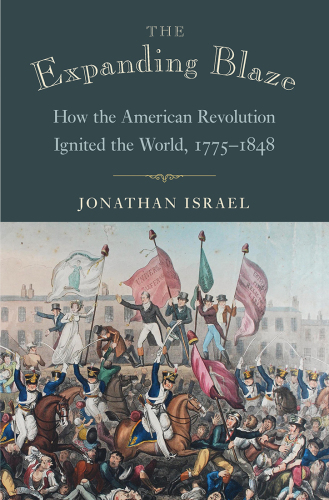
The Expanding Blaze
How the American Revolution Ignited the World, 1775-1848
کتاب های مرتبط
- اطلاعات
- نقد و بررسی
- دیدگاه کاربران
نقد و بررسی

July 24, 2017
Israel (Revolutionary Ideas), professor emeritus of modern history at Princeton’s Institute for Advanced Study, stoutly makes the case that the American Revolution was “of immense consequence for America’s future and for the rest of globe.” Though not a new argument, it has never before been made so fully or with such convincing force. Known for many works on the Enlightenment, Israel here carries onto the American scene his controversial argument that there were two “Enlightenments”: the “moderate” and the “radical.” Only American representatives of the radical one, he argues, fully gave up on traditional religion, mixed government, and superstition in favor of secular representative government and thought. While open to the same criticisms that his moderate-radical dichotomy has long faced, i.e. that it is oversimplistic, Israel’s argument here doesn’t detract from the work’s exhilarating urgency. Nor does it mar Israel’s success in showing the American Revolution’s influence on spurring revolutionary activity in such places as Haiti, Ireland, and Latin America. He follows others in placing American events into their broadest transatlantic context and he puts intellectual currents at the center of his story by arguing against others that the relevance of the American Revolution to world affairs has never ended. Like Israel’s previous books, this bravura, complex, learned interpretation of 75 years of revolutionary history is sure to stir debate.

July 15, 2017
A leading historian of the Enlightenment explores the widely differing philosophies that led to the American and French revolutions and their social, cultural, and ideological impacts on the world.Key themes of all revolutions include democratic vs. aristocratic republicanism, support or rejection of universal rights, suffrage qualifications, and the place of religion in society. At the heart of most of the Atlantic Revolutions of the late 18th century and first half of the 19th century was the rivalry between moderate and radical enlightenment. The moderates sought mixed government along the British lines while the radical side demanded separation of church and state and no established monarchy or aristocracy. In this epic work of historical scholarship, Israel (Emeritus, Modern History/Institute for Advance Study, Princeton Univ.; Revolutionary Ideas: An Intellectual History of the French Revolution from The Rights of Man to Robespierre, 2014, etc.) amply explains the concepts that drive revolutions and how they are shaped by organized vanguards interpreting the general discontent and challenging the status quo. He also explores the many different intellectual forces at work: the influence of writers like Locke, Montesquieu, Hume, and Paine, and especially the almost polar differences among radical and moderate revolutionaries. Showing the significance of the French Revolution in America, Israel notes that the Reign of Terror was viewed as a horrific aberration. Meanwhile, the Jeffersonians constantly butted heads with the Hamiltonians, and while Benjamin Franklin embodied the highest values of the American Revolution in Europe, his radicalism was divisive. Due to this friction, as well as incompetent ambassadors from both France and America, it is actually surprising that the American Civil War didn't break out much sooner. This is not just a history of the French and American revolutions, however, as the author masterfully examines Canadian involvement, the Haitian slave rebellion, the four Anglo-Dutch Wars, and fighting in the Cape Colony and well beyond to Greece, Spain, South America, and other areas. An impressively broad scholarly history whose readability and smooth organization make it a joy to read.
COPYRIGHT(2017) Kirkus Reviews, ALL RIGHTS RESERVED.

























دیدگاه کاربران